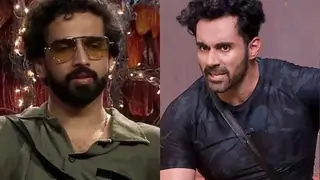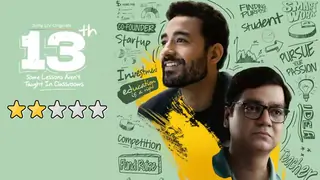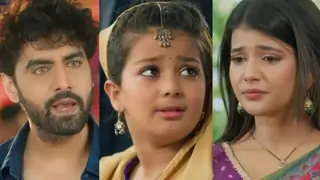Originally posted by: RadhikaS0
Lasya,
🤗
I want to give you a big hug for writing what was on my mind in the morning. I saw yesterday's episode after quite a few days break and I really liked it. I was quite intrigued by how Jalal was finding ingenious ways to teach Salim the importance of learning to defend people at all times. I was quite upbeat till I came to the forum in the afternoon and all my enthusiasm died after reading all the negative press about Jalal in yesterday's episode.
I agree that Jalal could practise what he preaches to Salim. But I do believe that most parents don't let their weaknesses come in the way of teaching their kids the right things. Suppose a parent smokes or drinks. Would they encourage their child to do the same? Usually not. So telling Jalal to practise what he preaches is like saying every parent should first become perfect before they try to teach their kids anything.
After all, we are not all of us Gandhiji, who started drinking milk so that he could tell a young boy, whose mother had brought him to meet Gandhiji, the importance of drinking milk.
The past is an indelible blot on Jalal. But should the past be held against him at all times even when he is trying to teach his son something positive and useful?
Today, we harp on innovation in teaching and using out-of-the-box ideas to stimulate learning in young minds. And Jalal was quite innovative in planning an attack so that Salim's reactions in a crisis could be gauged. Salim appears a fearful child. Jalal wanted to impress on him the importance of learning sword fighting at least for self-defence and for defending the people who would be dependent on him as a king to protect them. And he did succeed in getting some action from Salim.
I did not find it odd that he asked Salim why he had not opposed Ruq's decision to remove Anar's father from his job. Now Salim may or may not oppose Ruq. But he would at least learn one thing - that being the wali-ahad, he is not so important that no one can stand up to him without fear of losing their job. What Jalal was stressing on was that a king's personal ego should not stand in the way of justice. That if someone made a mistake (as Salim believed Anar had done), it was the duty of a wali-ahad and a Shahenshah to forgive them (for forgivable mistakes, not punishable offences) and not pull rank on them, punish them unnecessarily, and spoil their lives/future through a thoughtless/impulsive gesture like Ruq had done.
Jalal may not have punished Ruq till date. But he is certainly aware of her character and her flaws. He wants Salim also to be aware of the possibility of adults, including parent figures, being capable of making mistakes. He wants to bring it home to Salim that respected figures in our lives could go wrong and we should not trust their decisions blindly but learn the confidence to be able to question them, when required.
Salim / Jahangir is well-known for his deep sense of justice. It is said anyone could ring a bell outside the palace anytime of the day or night seeking justice and Jahangir would instantly come to redress their grievance. Such a strong sense of justice must surely have been learnt from his parents from an early age.
Jalal knows that it is not an easy task to stand up to Ruq and question her. Salim raises this point. And in response to this, Jalal says that Salim can resort to a simple white lie if he is not up to facing his opponent to ensure justice is done. Yes, lying is not to be encouraged and parents certainly must not teach children to lie. But in real life, many parents do end up asking their kids to tell small white lies on their behalf. Or force them to lie by pressurising them unnecessarily. That is as good as teaching children to lie.
Values and other important aspects of ruling such as a sense of justice, equality and tolerance, being a good warrior, diplomacy (which is nothing but the fine art of lying with a straight face), understanding the people and their problems, not having an ego, and so on - these must all be taught from an early age at all times and in all possible ways.
If a father, a king, is trying to do that, it should be lauded. Because parenting even now is usually a mother's job and a king would have rather employed teachers for training princes rather than taking upon the added responsibility on their shoulders.
Jalal missed out on his parents' support and guidance while growing up and never really had a normal childhood. He is trying to make sure that at least he is there for Salim.
Jodha should have supported his talk about caring for the awaam, considering that it was she who had made Jalal aware of his duties towards his awaam in the first place. It was odd that she should have said that Salim was too young to learn about responsibilities. A prince is never too young to learn and take on responsibility because the king's life is never certain. The king could be killed by anyone at any time. Then what would the prince do?
By assigning subahs to Salim, Jalal was introducing him to the nuances of ruling a vast empire.
Through the jugalbandi of swords and ghungroos, Jalal was trying to gauge Salim's interest area and teach him the importance of focusing on one thing, keeping all other distractions at bay.
I have no complaints with Jalal teaching Salim a few facts of life, even if he himself never adhered to them. At least he is passing on the right values to his son, instead of pampering him silly and turning him into a wastrel.
I am surprised by the passive mother, Jodha. Apart from music, Jodha can teach him so much. From sword fighting, horse riding, archery to hindi/urdu to scriptures to features of both religions to lessons about the lives of great kings and warriors. But none of this is being shown.
When the dacoits attacked Jodha and Salim, Jodha would have been capable of handling them, considering she even fought the mirchi war in a pregnant condition. But she was shown to be so weak that she needed to be defended by her young son. Salim doesn't even seem to be aware of his mother's various hunars. What happened to the hunar ki khaan? What happened to the active teacher / learner who interacted with Rahim so well?
Rahim was very lucky to receive the best training from Jalal, Jodha and Salima. Even Salim isn't so lucky. And the other princes are totally off radar. This is weird. Because ALL princes were trained in everything required to rule well. Because the crown prince could die and pave the way for another prince to ascend the throne. Or even otherwise, all princes represented the country and were involved to a greater or lesser extent in ruling it. So all of them need to learn the same lessons. But Murad and Daniyal are not given any personal attention. It's as if Salim is sent to a prestigious private school while the other 2 princes attend a government school. And God knows, what kind of education Mehtab is getting.
Thanks Lasya, for making this thread and letting me speak out what was on my mind. 😊 Hope you don't mind the lengthy diatribe. 😛




























